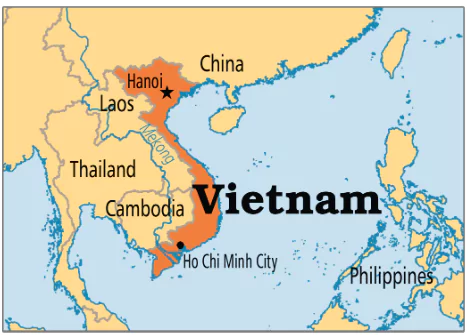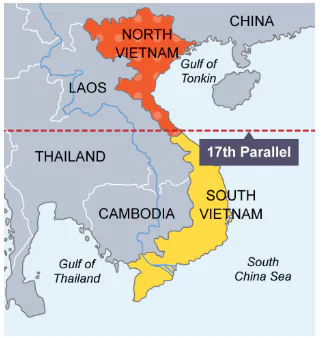The year 2025 commemorated the 50th anniversary of the Vietnam War’s end (1955–1975), with April 30 marking the fall of Saigon.

Origins of the Vietnam War
- Colonial Background
- French Indochina: From the mid-19th century, Vietnam was a French colony.
- During World War II, France was occupied by Germany and Japan took control of Vietnam.
- Ho Chi Minh, a committed socialist and nationalist, formed the Viet Minh to fight Japanese forces.
- Post-WWII and First Indochina War
| The Viet Minh was a Vietnamese organization, officially known as the League for the Independence of Vietnam, that fought against the Japanese and French for national independence from 1941 to 1954. |
-
- After Japan’s defeat, France returned to reclaim Vietnam but armed resistance by Ho Chi Minh.
- Resulted in the First Indochina War (1946–1954).
- The US backed France fearing communist expansion.
- Geneva Accords (1954)
- After France’s defeat at Dien Bien Phu, Geneva Accords signed:
- Vietnam temporarily divided at the 17th Parallel:
- North Vietnam: Ho Chi Minh (Communist)
- South Vietnam: Emperor Bao Dai (later Ngo Dinh Diem)
- Planned elections in 1956 to reunify the country were cancelled by Diem.
- Rise of Diem and US Involvement
- Ngo Dinh Diem (Catholic in a Buddhist-majority nation) became South Vietnam’s leader With US support.
- Diem refused elections fearing communist victory.
- US President Eisenhower (1953 – 1961) acknowledged Ho Chi Minh would have won the elections.
US Involvement & Escalation

- Cold War & Containment Policy
- Backdrop: The Cold War between the US and USSR discouraged direct war due to mutually assured destruction from nuclear arsenals.
- Instead, they sought influence through proxy wars—Vietnam became one such battleground.
- The US feared the “Domino Effect”: if South Vietnam fell to communism, other Southeast Asian nations (Laos, Cambodia, Thailand) might follow.
- Gulf of Tonkin Incident (1964)
- Alleged attack by North Vietnamese patrol boats on US Navy vessels.
- Led to the Gulf of Tonkin Resolution, passed by US Congress:
- Gave President Lyndon B. Johnson authority to use military force in Vietnam without a formal war declaration.
- My Lai Massacre (1968): US troops killed hundreds of Vietnamese civilians, fueling anti-war protests.
- Tet Offensive (1968)
- Surprise attack by North Vietnamese & Viet Cong on over 100 cities.
- Though a military failure for the North, it shocked the US public and eroded support for the war.
- Forced Johnson to halt escalation and announce he wouldn’t seek re-election.
End of the Vietnam War
- Shift in Public Opinion
- Tet Offensive (1968) exposed the futility of continued US involvement despite government claims of progress.
- Widespread anti-war protests erupted across the US, including college campuses (e.g., Kent State shooting).
- The war lost public and political support in the US.
- Nixon’s “Peace with Honor” Strategy
- Introduced Vietnamization:
- Gradual withdrawal of US troops.
- South Vietnamese army to take over ground operations.
- Despite peace talks, Nixon expanded bombing into Cambodia and Laos.
- Continued heavy casualties and My Lai Massacre (1968) further discredited US involvement.
- Paris Peace Accords (1973)
- Signed between US, South Vietnam, North Vietnam, and NLF (Viet Cong).
- Key terms:
- Ceasefire and US troop withdrawal.
- Exchange of prisoners of war.
- However, conflict continued between North and South Vietnam post-US exit.
- Fall of Saigon (April 30, 1975)
- North Vietnamese forces launched a final offensive.
- The South Vietnamese army collapsed.
- Saigon captured and renamed Ho Chi Minh City.
- Vietnam reunited under communist rule in 1976 as the Socialist Republic of Vietnam.
Implications of the Vietnam War
Implications for the United States
- Human & Psychological Costs
- 58,000 US soldiers killed, 304,000 wounded.
- Veterans returned with deep psychological scars.
- Crisis of Trust in Government
- The war eroded public confidence in elected officials.
- Pentagon Papers revealed misleading government narratives.
- As Karl Marlantes (Vietnam War veteran) stated: “It made us cynical and distrustful of our institutions.“
- Political & Legislative Outcomes
| Vietnam Syndrome refers to the post-Vietnam War era reluctance of the United States to engage in prolonged and costly foreign military interventions, particularly those involving ground troops and unclear national security interests. |
-
- Led to passage of the War Powers Act (1973) to check presidential war-making powers.
- Rise of the Vietnam Syndrome – American reluctance for future foreign military interventions.
- Media & Civil Society
-
- First televised war: graphic visuals of violence, napalm victims, and civilian massacres.
- Fueled massive anti-war protests, including at Kent State University (1970).
- Shaped new norms for media freedom and government accountability.
Implications for Vietnam
- Massive Human & Environmental Damage
- Estimated 4 million Vietnamese killed or wounded.
- 1.3 million civilian deaths in South Vietnam alone.
- US dropped more bombs on Vietnam than in all of WWII.
- 5 million acres of farmland destroyed; long-term food shortages.
What is Agent Orange?
- Agent Orange was a herbicidal chemical used by the United States during the Vietnam War (1961–1971).
- It was sprayed to defoliate forests and destroy crops used by Viet Cong and North Vietnamese forces.
- Composed of 2,4-D and 2,4,5-T herbicides, with dioxin (TCDD) as a contaminant — highly toxic.
|
- Agent Orange & Chemical Warfare
- ~74 million litres of herbicides sprayed.
- Agent Orange exposure led to:
- Birth defects (spina bifida, cleft palate, etc.).
- Cancers, neurological disorders across multiple generations.
- Over 3 million affected, including children.
- Environmental damage: forests turned barren, croplands ruined.
- Post-War Repression & Economic Isolation
- After 1975 reunification:
- Re-education camps for ~2.5 million Southerners.
- Widespread discrimination against South Vietnamese
- The US imposed a trade embargo, worsening poverty and delaying recovery.
Geopolitical and Global Impact
- Decline of US Global Standing
- War revealed limits of US military power.
- Challenged the US image as a global superpower.
- Strengthened anti-imperialist movements globally.Lessons in Asymmetrical Warfare
- Demonstrated effectiveness of guerrilla tactics.
- Underscored limitations of superior technology against nationalist resistance.
- Symbol of Global Solidarity
- Inspired worldwide anti-war and peace movements.
- Unprecedented global opposition to US policy.
Ideological Implications: Communism vs Capitalism
- Cold War Symbolism: The Vietnam War was a proxy conflict in the larger Cold War rivalry.
- The conflict aligned communist North Vietnam (with Soviet and Chinese support) against US-backed capitalist South Vietnam and its coalition partners.
- Test of Ideological Resolve: The US viewed intervention as essential to contain communism (Domino Theory).
- North Vietnam saw the war as part of an anti-imperialist revolution.
- Outcome: Communist ideology triumphed in Vietnam, but Domino Theory failed—other Southeast Asian nations did not fall to communism.
- Undermined Western narrative of ideological supremacy and triggered global rethinking of foreign intervention policy.
India’s Role and Involvement in the Vietnam War
- Diplomatic Standpoint
- India maintained a principled non-aligned position as founding member of Non-Aligned Movement (NAM) but was sympathetic to North Vietnam’s anti-colonial struggle.
- India recognized the Democratic Republic of Vietnam (North Vietnam) early on and maintained diplomatic relations.
- Political Support for Vietnam
- Backed Ho Chi Minh’s Government: First non-communist country to recognize North Vietnam (1954)
- Opposed US intervention at UN forums, even at the cost of straining Indo-US relations.
- Nehru’s Stance: Called Vietnam War “neo-colonialism” (1962)
- Allowed Vietnamese diplomats to operate in Delhi despite US pressure
About International Commission for Supervision and Control (ICSC)
- Also known as the International Control Commission (ICC), it was an international force established in 1954 to monitor compliance with the Geneva Accords that ended the First Indochina War.
- The ICSC comprised inspectors from Canada, Poland, and India.
- Operations: The commission operated in various locations throughout Laos, Vietnam, and Cambodia, investigating compliance and monitoring the enforcement of the peace accords.
- Purpose: To supervise the ceasefire, the withdrawal of French troops, the repatriation of military and civilian prisoners, and the return of refugees to their homes.
|
- Role in the Geneva Accords (1954)
- India played a key role as Chair of the International Commission for Supervision and Control (ICSC):
- Established under the Geneva Accord to monitor the ceasefire and the political settlement.
- India’s Balancing Role: Navigated between Western and Communist blocs in its ICSC leadership.
- Support to Vietnam
- India provided moral and political support to Vietnam’s struggle for independence and unification.
- Advocated for peaceful resolution and upholding of the Geneva Accords.
- Expressed solidarity with Vietnamese people during US bombings and condemned the use of chemical weapons like Agent Orange.
- Post-War Relations
- India was among the first countries to establish full diplomatic ties with the unified Socialist Republic of Vietnam in 1972.
- Bilateral ties deepened, including cooperation in: Oil exploration; Defense and capacity building; Strategic partnership (from 2007); Comprehensive Strategic Partnership (since 2016).
- Multilateral Cooperation
- India and Vietnam now collaborate on platforms such as: ASEAN; East Asia Summit; Mekong-Ganga Cooperation; United Nations.
- Vietnam supports India’s candidature for permanent seat at the UNSC and membership in APEC.
About Vietnam
- Location: Southeast Asia, on the eastern edge of the Indochinese Peninsula.
- Borders:
- North: China
- West: Laos and Cambodia
- East and South: South China Sea
- Major Rivers: Red River (north); Mekong River (south)
- Capital: Hanoi
- Major City: Ho Chi Minh City (formerly Saigon)
- Currency: Vietnamese Dong (VND)
- Government: Socialist Republic (One-party communist state)
- Independence: Declared from French colonial rule on 2nd September 1945
- Economy: Mixed economy with a market-oriented reform policy since 1986 (Doi Moi).
- Major Religion: Buddhism (with elements of Confucianism and Taoism)
- Language: Vietnamese (with Latin script)
|
![]() 9 May 2025
9 May 2025


